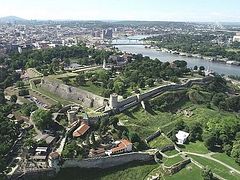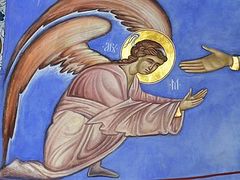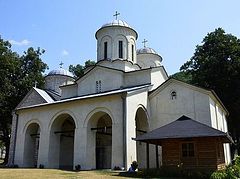One of the things I most value about the faith community I belong to is that no matter where I go, if there’s an Orthodox church around, I have instant family. Nowhere was this more demonstrable than on a recent trip to Serbia, and in particular a small town where I spent a major feast.
It was the eve of Saints Peter and Paul, and my family was returning to our home base outside Belgrade after a trip to Macedonia. We needed lodging for the night, and my slightly outdated guidebook recommended a spa town called Vranjska Banja.
Due to mismanagement, the hotel was permanently closed, but we found rooms in a private home. We also found the town’s beautiful church perched atop a prominent hill overlooking the square. This made attending Liturgy the next day a no-brainer.
Ironically, being a priest can make it complicated to simply show up at services elsewhere. With schismatics and non-canonical types around, a priest should call ahead and secure the blessing of his bishop and the bishop where he’s travelling.
Having made so such arrangements, we asked our lodging host if he knew when Liturgy would be. He simply pulled out his phone and called the priest from among his contacts. That’s what an Orthodox culture looks like.
We showed up early the next morning to introduce ourselves before services. When Father Boban walked over from his rectory, his welcome was instantaneous. Between my halting Serbian and my wife’s fluency, we explained who we were and asked if we could receive Communion today.
Not only was that a yes, but Fr. Boban warmly invited me to serve with him. He offered vestments (I’d brought mine, for communion). Once vested, he even asked me to perform the service of preparing the bread and wine, while he assembled the music.
And when I took my place at the right side of the altar (where a second priest stands at a concelebration), he put his arm around me and propelled me to the front. He wished me to preside!
I had my multilingual Liturgy book, but my Serbian is by no means smooth – not to mention the rubrical differences that’d surely arise—yet Fr. Boban was firm in his hospitality.
That Liturgy is one I’ll never forget. There were points where I had to revert to English, but otherwise Fr. Boban slowly whispered the proper pronunciation of the Serbian prayers about two words ahead of my saying them aloud. He also led the congregational singing of responses.
By God’s Grace and my host’s goodwill, we celebrated “a blameless Liturgy” (as Fr. Boban called it). He then had me consume the chalice while he celebrated slavas for those keeping Ss. Peter and Paul.
As we unvested, I said (in Serbian): “You don’t speak English, and I don’t speak Serbian well, but we both speak the Liturgy.” His reply: “I to, Bog zna” (And that, God knows).
We joined him and his flock afterward for a light breakfast of Slava bread, watermelon and excellent rakija—served from a reused, plastic bottle, as any good home-distillation should be. And finishing mine, when I saw him (from the corner of my eye) pour another, I didn’t object. Later, a third toasted Orthodox brotherhood.
Our host’s final act of hospitality came when we asked if there was a menjacnica (currency exchanger) around. Rather than just telling us where to find it, he led us there. As we walked along the town streets, people greeted him. He asked about their families. It was clear his parish was the whole town.
As we prepared to resume our journey, Fr. Boban insisted that next time we come to Vranjska Banja, we should stay with him. That I’m sure we will.
Fr. Barnabas Powell is the priest at the St. Katherine Church (OCA) in Kirkland, Washington.






